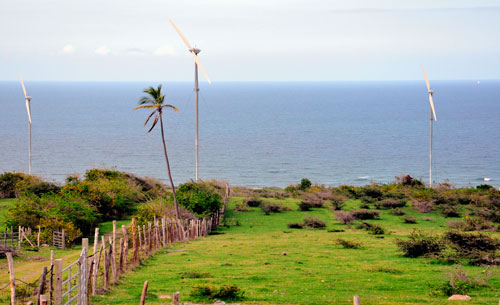Caribbean
The World Bank has expressed concern about what it described as the exorbitant cost of sending remittances to the Caribbean and other places, saying that forcing migrant workers to pay as much as US$50 to send US $200 is “wrong.”
The Washington-based financial institution said this is especially so when workers are “sending salaries they have earned in the hope of supporting families back home.”
It said US$200 often is a very significant sum for migrants’ family income.
“There was little transparency and no global effort to address this problem until the World Bank helped form a coalition to monitor the process and create a ‘one stop shop’ information system to help remittance-senders compare services and costs,” the statement said.
The World Bank said the high cost of sending remittances internationally has typically been caused by a combination of obstacles in each local market, both in sending and receiving countries.
Antigua
Newly-appointed CEO of cash-strapped regional airline LIAT British-born David Evans, who took up his job recently, is promising to listen to “those closest to the customers and who have the best insight into what the customers want.”
Evans, who succeeds Trinidadian Ian Brunton, who resigned in September 2013 — has spent decades in senior roles within the aviation industry.
“The years I have spent in the airline business have taught me that there is no monopoly of wisdom in the CEO’s office,” Evans said in underscoring the value of listening to the various stakeholders.
The former Caribbean area manager for British Airways, Evans said he plans to begin his duties by listening to those “who definitely know the airline much better than I do.”
The company, with the assistance of a loan from the Barbados-Based Caribbean Development Bank, is engaged in a re-fleeting exercise, and Evans said the new ATR aircraft represent a major opportunity to enhance the in-flight experience.
Bahamas
Authorities in The Bahamas recently detained 132 Haitian migrants in a boat that broke down off a remote, sparsely populated island.
Police said l07 males and 25 females were intercepted off the Coast of Ragged Island.
Local fishermen alerted authorities about the disabled boat in the archipelago’s southern waters.
Bahamian officials flew the migrants to the main island of New Providence for processing by immigration officials.
Recently, another 89 Haitians migrants aboard a boat were seized in Bahamian waters.
Barbados
Barbados has over the past five years destroyed 13 million of the dangerous invasive species of the Giant African Snails.
This was revealed by Ian Gibbs, chief entomologist with Ministry of Agriculture, while speaking at a seminar hosted by the U.S. Embassy in Barbados at Jackman Prescod Polythenic, where American entomologist Trevor Smith outlined Florida’s efforts against the giant African land snail.
“In many parishes on the island the snail population is significantly down,” Gibbs said.
He revealed that the giant African snail, where is not indigenous to Barbados, first came to the island on a shipment from St. Lucia.
The snails are native to Africa, particularly Kenya and Tanzania. They were first discovered in the U.S. in l966.
They are one of the most damage-causing pests to crops and can eat almost 5000 species of plants.
Grenada
Grenada says Venezuela has given an undertaking that it will fund projects to eradicate hunger and poverty in Latin America and the Caribbean.
Minister of Economic Development, Trade, Planning and Co-operatives, Oliver Joseph, said the pledge was made during a meeting of PetroCaribe recently in Caracas.
“They clearly outlined what needs to be done in order to eradicate poverty and Venezuela will offer support to member states for this initiative,” Joseph said.
“Grenada is part of this initiative and we stand to benefit from this drive to eradicate hunger and poverty in Latin America and the Caribbean” he added.
Joseph, who led a two-member delegation to the meeting, said five areas had been identified for support.
Jamaica
Jamaicans are protesting against a decision of the Portia Simpson-Miller administration to introduce a tax on bank withdrawals.
Finance Minister Dr. Peter Phillips said the government intends to raise J$6.6 billion during the fiscal year, as he led off the recent debate on the J$539.3 billion national budget.
The government says it intends to receive J$2.5 billion in revenue from the new levy on the use of ATMs/ABMs, electronic banking, point of sales, checks and internet transfers when the measure goes into effect in June.
The new levy on withdrawals from deposit-taking institutions and security dealers will be calculated on a graduated rate system, with withdrawals less than $1 million being subjected to a 0.01 percent tax.
Dr. Phillips said the measure was expected to bring in revenue estimated at J$2.25 million this fiscal year and would provide the bulk of the revenue in new taxes.
In a statement, the Citizens Action for Principle and Integrity (CAPI) said it would also launch an online protest initiative against the tax, which becomes effective June 1, 2014.
CAPI said it opposes government’s move to impose the “withdrawal tax”, deeming it “oppressive, unconscionable and will prove inimical to its own growth agenda as it will send the wrong message to potential investors”.
CAPI added that it is inviting the participants of churches, trade unions and all civil society stakeholders to join in its “civil protest against a tax, which will prove deleterious to the economic health of the country and family.”
St. Lucia
St. Lucia has announced the imposition of a 70 percent tax on Barbadian goods, effective May, 1, 2014 and Barbadian authorities said there must be open to frank discussions on the matter.
But Castries in the past pointed to a 2012 Council of Trade and Economic Development (Coted) decision which allows for Caribbean Community (CARICOM) lesser developed countries (LCD) to implement the duty on products from the regions’ more developed countries.
Barbados International Business Minister Donville Innis says it will use the May 6-10 Council of Trade and Economic Development (Coted) meeting to iron out a possible trade dispute with St. Lucia.
While Barbados has not commented officially on the matter, Innis maintained his government will not allow the situation to escalate into a trade war.
Suriname
Police have arrested a 24-year-old woman after a “cocaine ball” had been found in her vagina as she was preparing to board a flight from Suriname to Amsterdam.
Investigators said the cocaine weighed 2.317 grams and was discovered after members of the Anti-Narcotics Squad carried out a search.
The Surinamese national, has appeared in court and was granted bail to reappear later this month.
Police have caught several women in recent months trying to use this method to smuggle cocaine.
Trinidad
The Caribbean region has been has an “unacceptable high” rate of murders, averaging around 30 per 100,000 citizens.
This was disclosed by Trinidad and Tobago National Security Minister Gary Griffith at the opening of the Association of Caribbean Commissioners of Police at the Hyatt Regency, Port of Spain last week.
The four-day conference was titled: Working in partnership to combat trans-national organized crime.”
Griffith said the crime situation in Trinidad and Tobago was an unfortunate mirror image of what was happening in the wider Caribbean. T&T recorded 153 murders up to the end of April this year.
“In our country, while we have seen a massive drop in total serious crimes, over recent years reaching a 29-year low in 2013, we are still challenged with the unacceptable high rate of murders.
He said statistics show that more than 70 percent of all murders in T&T and the Caribbean region were committed by firearms as the weapon of choice of criminals.
Griffith said it was imperative that Caribbean law enforcement leaders used conferences, like this one, to explore innovative alternatives to the traditional law enforcement approach, to develop workable solutions and new methods to reduce the vulnerabilities commonly exploited by trans-national organized crime.
Compiled by Azad Ali
























